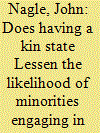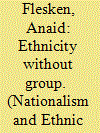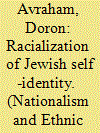| Srl | Item |
| 1 |
ID:
122814


|
|
|
|
|
| Publication |
2013.
|
| Summary/Abstract |
This article examines the impact of asymmetrical devolution on mass preferences for devolution and voting behavior in the regions of Spain. Rather than mitigating demands for greater devolution, asymmetry encourages the escalation of such demands in both the ethnically distinct and the majority-dominated regions. Preferences for symmetry and perceptions of inequality that result from asymmetry are transformed into pressures for further devolution via the electoral mechanism. These findings suggest asymmetrical devolution may be an unstable solution for managing ethnoregionalism, and that Stepan, Linz, and Yadav's strong endorsement of asymmetrical federalism as a tool for the management of ethnoregionalism in democracies should be qualified.
|
|
|
|
|
|
|
|
|
|
|
|
|
|
|
|
| 2 |
ID:
122815


|
|
|
|
|
| Publication |
2013.
|
| Summary/Abstract |
Existing research has demonstrated that the ability of secessionist movements to mobilize is highly contingent on assistance from external actors, especially via transborder ethnic ties. The specific relationship between kin state and kin group is seen as particularly enhancing to opportunities for secessionism/irredentism. Yet, the analysis of data (1989-2011) does not support this claim. Relatively few groups with kin states have engaged in violent secessionism, and these examples are mostly restricted to successor states from Yugoslavia and the Soviet Union. Thus, this article argues that there are a number of reasons why the relationship between kin state and group increasingly engenders moderation. These reasons are the following: the failure of irredentism as a policy and idea; the asymmetric and problematic relations between kin state and group; and the protective capacity and the provision of resources by the kin state. As such, while external help is vital for secessionist groups to successfully mobilize, kin states typically provide assistance that fosters restraint and peace among their kin.
|
|
|
|
|
|
|
|
|
|
|
|
|
|
|
|
| 3 |
ID:
122817


|
|
|
|
|
| Publication |
2013.
|
| Summary/Abstract |
This article examines recent changing dynamics of indigeneity in Bolivia. It argues that despite competing definitions of the indigenous on the basis of attributes as diverse as skin color or vocation, the category is invested with meaning and used as a basis for collective action. Yet, debates surrounding the constitution of 2009 show that clearly defined attributes are necessary for such action to have a lasting effect. Overall, the mobilization has not led to the manifestation of ethnic categories, as observed elsewhere, but to increased contestation. The case suggests a fruitful analytical distinction between attributes, meaning, and action in ethnic dynamics.
|
|
|
|
|
|
|
|
|
|
|
|
|
|
|
|
| 4 |
ID:
122816


|
|
|
|
|
| Publication |
2013.
|
| Summary/Abstract |
After a protracted war of secession in 2001, the Bougainville region of Papua New Guinea was granted autonomy and deferred a referendum on its political future. This article argues that the Bougainville case highlights the challenges posed by attempts to settle self-determination disputes using these tools. It considers the challenges posed by deferred referendums, principally how to reconcile competing interpretations of the identity and future political status of the region. It also considers the challenges posed by attempts to negotiate the relationship between the unique identities of autonomous regions and their identities within the larger state.
|
|
|
|
|
|
|
|
|
|
|
|
|
|
|
|
| 5 |
ID:
122818


|
|
|
|
|
| Publication |
2013.
|
| Summary/Abstract |
While excluded from society and subjected to discrimination under government measures, German Jews under the Nazi regime during 1933-38 had conducted a public discourse regarding their collective identity. Acknowledging the failure of emancipation, Zionist and Orthodox Jews used racial vocabulary and concepts to produce an independent stance and to define political ends. Such an effort, however, did not begin during the 1930s. It was a reinforcement of racial ideas prevalent among German Jewish scientists since the late 19th century. In the 1930s, though, this "racialization" turned into a popular one, thus forming Jewish public opinion and political aspirations. It functioned as a means to respond to the inferior racial status and exclusion imposed on German Jewry by the Nazis.
|
|
|
|
|
|
|
|
|
|
|
|
|
|
|
|